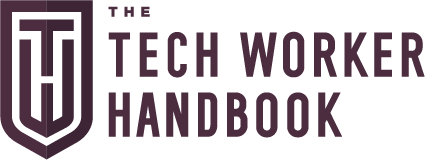With labour and ethical practices of big tech companies under the microscope, The Tech Worker Handbook is an essential read if you’re looking to speak out about issues that are in your workplace for the public interest.
Branch Magazine highly recommends you check out the handbook yourself, but we’re giving you a quick guide to how to navigate it.
Why this guide?
Deciding to go toe-to-toe with a powerful and well-resourced corporation is difficult for many reasons. Employers of tech workers — tech giants and the myriad companies they turn to for contractors — not only have entire departments dedicated to legal, media, and security issues, but they also have the resources to hire virtually unlimited external assistance when dealing with threats.
The Tech Worker Handbook is not a how-to, set of instructions, checklist, or call to action to whistleblow. Whistleblowing — the act of speaking up in order to improve a situation for others — is an individual decision that should be made after a careful consideration of risks, options, and intended outcomes.
A worker who considers sharing information that is in the public interest, against the wishes of their employer, is a threat. This Handbook was organized with those workers in mind.
Need legal help?
If something has happened at work and you want legal advice, the Tech Worker Handbook gives a great guide on what steps you can take and consider.
Seeking legal advice can be scary, but it’s a lot scarier to go up against a general counsel and a whole team of corporate lawyers without any legal help of your own.
The Tech Worker Handbook outlines who and where you can go to
In this guide, The Signals Network addresses the legal questions and issues that may be helpful to tech workers before, during, and after deciding to speak out. If early access to any of this information prevents even one worker from making an unnecessary error, the guide will have done its job.
How to navigate the media?
Are you looking to be a source or just having a friendly conversation? What does it mean to speak with a reporter in the background? How do you retain control of your story once you let another person tell it?
In this media guide, the experts at Lioness have helped workers across dozens of different industries tell their stories publicly, and their knowledge and experiences inform this guide. We all benefit from an environment in which tech workers are empowered to engage with members of the media on their terms — and with a full understanding of the role that responsible reporters play in providing transparency to the public.
How to stay secure?
Becoming the target of a company or organization that has perfected the art of surveillance is frightening.
If you find yourself the target of organisational surveillance – how do you protect yourself when your only devices are company owned, your onboarding requires signing into your personal accounts, or all of your personal devices have company-managed software installed on them?
Even after you take care of all those concerns, how do you think about protecting your identity after you become a “public figure” overnight or your former employer’s legal team sends private investigators to harass you and your family?
In this guide, Matt Mitchell and the experts of Elite Strategy Global cover a range of information and physical security concerns that all tech workers should be aware of — whether or not they ever consider whistleblowing.
You are not alone
The role of whistleblowers is crucial in exposing wrongdoing and misconduct.
In recent years, whistleblowers have been instrumental in exposing some of the most egregious forms of misconduct in tech, revealing serious systemic problems in a fast growing industry over which there has been little oversight or regulation.
The Tech Handbook provides stories are from whistleblowers who did go public or who are prepared to speak publicly about their experiences.
Read how Clarissa Redwine joined Kickstarter as a Senior Design and Tech Outreach Lead in 2016 but was fired three years later, after her best quarter, for being a visible organizer of the first tech company union in US history.
Each of these stories in the handbook hopes that their stories will be helpful to others who may find themselves in the same position, and helpful to the many people and organizations out there who could support whistleblowers better and help them make the difference they seek.
“There’s no chance of accountability without transparency.”
Ifeoma Ozoma, Tech Worker Handbook founder
If you’re a worker in tech seeking support, check out the Tech Worker Handbook here


